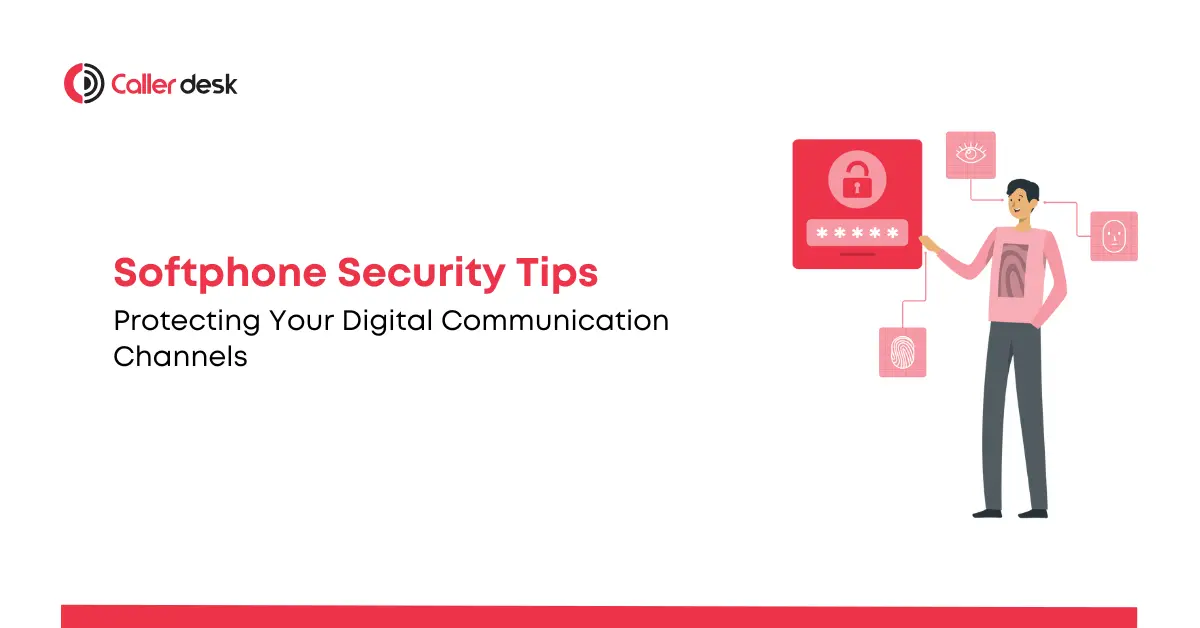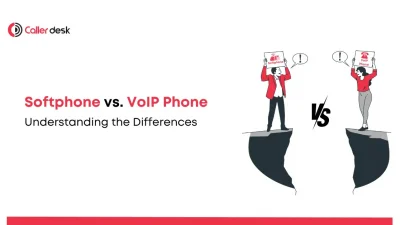Softphones have become a cornerstone of modern business communication. Offering unparalleled convenience, cost-effectiveness, and flexibility, these software-based tools empower teams to make and receive calls, exchange messages, and collaborate seamlessly from virtually anywhere. But as businesses increasingly adopt softphones for their communication needs, the importance of securing these systems has become paramount.
- 1 1. Use Strong Encryption Protocols
- 2 2. Set Up Multi-Factor Authentication (MFA)
- 3 3. Regularly Update Your Softphone Software
- 4 4. Use a Virtual Private Network (VPN)
- 5 5. Train Employees on Security Best Practices
- 6 6. Monitor and Manage Access Controls
- 7 7. Address Compliance Requirements
- 8 8. Prioritize Network Reliability
- 9 9. Conduct Regular Security Audits
- 10 Conclusion: Strengthening Softphone Security
- 11 Frequently Asked Questions
With the rise in cyber threats, safeguarding your softphone system is not just about protecting sensitive data—it’s about maintaining customer trust, ensuring business continuity, and meeting compliance requirements. Whether you’re a growing startup or a large enterprise, taking proactive measures to secure your communication channels is essential.
This comprehensive guide explores the challenges, risks, and solutions associated with softphone security, equipping you with actionable insights to keep your business safe.
1. Use Strong Encryption Protocols
Encryption is a non-negotiable element of secure communication. It ensures that data transmitted over the internet is unreadable to unauthorized users, making it a critical first line of defense against cyberattacks.
Key Encryption Standards for Softphones:
- Transport Layer Security (TLS): Secures communication channels by encrypting data during transmission.
- Secure Real-time Transport Protocol (SRTP): Protects voice data in real time, ensuring conversations remain private.
Why It Matters:
Without encryption, hackers can intercept calls and messages, potentially gaining access to sensitive information like financial details or confidential business strategies. By choosing a softphone solution like CallerDesk, which prioritizes end-to-end encryption, you minimize these risks and ensure secure communication.
2. Set Up Multi-Factor Authentication (MFA)
Passwords are no longer sufficient to protect your digital systems. Multi-factor authentication (MFA) adds an additional security layer, making it much harder for hackers to gain unauthorized access.
How MFA Works:
- Something You Know: Your password or PIN.
- Something You Have: A mobile device, security token, or authenticator app.
- Something You Are: Biometrics such as a fingerprint or facial recognition.
Benefits of MFA:
Even if a password is compromised, MFA prevents unauthorized users from accessing your system. It’s a simple yet powerful way to enhance softphone security.
3. Regularly Update Your Softphone Software
Cybercriminals exploit vulnerabilities in outdated software to gain access to systems. Regular updates close these gaps, ensuring your softphone system remains secure.
Best Practices for Software Updates:
- Enable Automatic Updates: Stay protected without manual intervention.
- Schedule Routine Checks: Regularly verify that all devices are running the latest version.
- Stay Informed: Follow updates and security bulletins from your softphone provider, like CallerDesk.
Pro Tip:
Always update not just your softphone software but also the operating systems of your connected devices for maximum security.
4. Use a Virtual Private Network (VPN)
Public Wi-Fi and unsecured networks are playgrounds for hackers. Using a VPN ensures that all data transmitted over the network is encrypted, adding an extra layer of protection for your softphone system.
Why a VPN is Essential:
- Secures Remote Access: Perfect for employees working outside the office.
- Protects Against Eavesdropping: Keeps hackers from intercepting sensitive data.
- Enhances Privacy: Masks your IP address and location.
For businesses with remote or hybrid teams, combining a VPN with CallerDesk’s robust security features provides a seamless and secure communication experience.
5. Train Employees on Security Best Practices
No matter how secure your technology is, human error remains a leading cause of security breaches. Educating employees on best practices ensures they act as the first line of defense.
Training Essentials:
- Password Hygiene: Teach employees to create strong, unique passwords and avoid sharing them.
- Phishing Awareness: Help them recognize suspicious emails, links, or attachments.
- Device Security: Stress the importance of locking devices and using VPNs when accessing softphones on public networks.
By making security a shared responsibility, you reduce the risk of breaches caused by user mistakes.
6. Monitor and Manage Access Controls
Granting unrestricted access to your softphone system increases the risk of unauthorized use. Implementing access controls ensures that only authorized personnel can access sensitive features and data.
Effective Access Control Practices:
- Assign user roles based on job responsibilities.
- Regularly review and revoke access for inactive or former employees.
- Use CallerDesk’s advanced access control features to manage permissions efficiently.
7. Address Compliance Requirements
For businesses handling sensitive information, compliance with industry regulations like HIPAA or GDPR is essential.
Key Compliance Measures for Softphones:
- HIPAA Compliance: Encrypt all communication and restrict access to patient data.
- GDPR Compliance: Protect customer data and ensure clear consent for its use.
Failure to comply can result in hefty fines and damage to your reputation. Partnering with a provider like CallerDesk, which adheres to global compliance standards, simplifies this process.
8. Prioritize Network Reliability
In regions with fluctuating internet quality, such as parts of India, network reliability can significantly impact softphone performance.
Optimizing Network Performance:
- Bandwidth Management: Prioritize VoIP traffic over other internet usage.
- Backup Internet Solutions: Use secondary connections for uninterrupted service.
- CallerDesk’s Network Tools: Designed to optimize performance even in low-bandwidth environments.
9. Conduct Regular Security Audits
Periodic security assessments help identify vulnerabilities before they can be exploited.
Audit Checklist:
- Review access logs for suspicious activity.
- Test the effectiveness of encryption protocols.
- Verify compliance with industry regulations.
Conclusion: Strengthening Softphone Security
Softphones are a game-changer for modern business communication, but their benefits come with security responsibilities. By implementing strong encryption, enabling MFA, maintaining regular updates, and educating employees, you can protect your digital communication channels from evolving cyber threats.
Additionally, prioritizing compliance with regulations like HIPAA and GDPR not only secures your operations but also builds customer trust.
With CallerDesk, you gain access to a secure, feature-rich softphone solution tailored to your business needs. From end-to-end encryption to robust network tools, CallerDesk ensures your communication channels remain safe, reliable, and compliant.
Take the next step towards secure communication—schedule your free demo with CallerDesk today!
Frequently Asked Questions
1. What is a softphone, and why does it need security measures?
A softphone is a software-based phone application that enables voice and video communication over the internet. Unlike traditional phones, softphones run on devices like computers, smartphones, or tablets. While they offer flexibility and cost savings, their reliance on internet connectivity makes them vulnerable to cyber threats like hacking, phishing, and data breaches. Implementing robust security measures ensures that sensitive business communications remain protected and reliable.
2. What encryption protocols should I look for in a secure softphone system?
Encryption is critical for safeguarding softphone communications. Look for systems that support Transport Layer Security (TLS) and Secure Real-Time Transport Protocol (SRTP). TLS encrypts data during transmission, preventing unauthorized access, while SRTP secures voice and video calls in real time. These protocols work together to ensure that your communication remains private and inaccessible to hackers or unauthorized users.
3. How does multi-factor authentication (MFA) enhance softphone security?
Multi-factor authentication (MFA) strengthens security by requiring users to verify their identity through multiple factors. For example, a user must provide something they know (password), something they have (a smartphone or token), or something they are (biometric data like a fingerprint). Even if a password is compromised, MFA ensures that unauthorized users cannot access the system without additional verification, making it a highly effective security measure for softphone systems.
4. Why is it important to update softphone software regularly?
Regular software updates are essential for maintaining a secure and efficient softphone system. These updates address known vulnerabilities, fix bugs, and enhance performance. Outdated software is more susceptible to cyberattacks, as hackers often exploit older systems. By enabling automatic updates, businesses ensure they always run the latest version of their softphone software, which includes critical security patches to counter emerging threats.
5. Is using a VPN necessary for softphone security?
Using a Virtual Private Network (VPN) adds a vital layer of security to softphone communications. A VPN encrypts all internet traffic, creating a secure tunnel between the user’s device and the internet. This is particularly important when using public Wi-Fi networks, which are more prone to cyberattacks. With a VPN, even if hackers intercept your data, the encryption ensures they cannot access sensitive information, making VPNs essential for remote workers or employees frequently on the move.
6. How can employee training reduce softphone security risks?
Employee training is crucial to minimize security risks associated with softphones. Even the most secure systems can be compromised through human error. Training should cover creating strong, unique passwords, recognizing phishing attempts, and avoiding unsafe practices like clicking on suspicious links. By equipping employees with the knowledge to identify and prevent security threats, businesses can significantly reduce vulnerabilities and enhance overall system security.
7. Are softphones compliant with regulations like HIPAA and GDPR?
Softphones can comply with regulations like HIPAA (Health Insurance Portability and Accountability Act) and GDPR (General Data Protection Regulation) if they implement the right security measures. These include end-to-end encryption, access controls, and regular risk assessments. Compliance ensures that sensitive data, such as patient records or customer information, is protected and handled responsibly. Choosing a provider like CallerDesk, which prioritizes compliance, can help businesses meet these regulatory requirements seamlessly.
8. What steps can I take to protect my softphone system from hacking?
To protect your softphone system from hacking, implement a combination of technical safeguards and best practices. Start with robust encryption protocols like TLS and SRTP to secure communication. Enable multi-factor authentication (MFA) to add an extra layer of protection. Regularly update your software to patch vulnerabilities, and use a VPN to secure connections on public Wi-Fi. Educating employees on safe usage and recognizing cyber threats further reduces the risk of unauthorized access.
9. How does CallerDesk ensure the security of its softphone systems?
CallerDesk takes a comprehensive approach to softphone security by integrating advanced encryption protocols to protect voice and data communications. The platform offers multi-factor authentication (MFA), ensuring only authorized users can access the system. CallerDesk also prioritizes compliance with global standards like GDPR and HIPAA, providing businesses with peace of mind. With regular updates, VPN support, and real-time monitoring, CallerDesk ensures a secure and reliable communication experience for businesses.
10. What should I do if my softphone system experiences a security breach?
In the event of a security breach, immediate action is critical. First, disconnect the affected system to prevent further damage. Notify your IT team or softphone provider to investigate the breach and identify its cause. Change all passwords and review access controls to ensure they are secure. Inform stakeholders and users about the breach, and comply with any legal obligations, such as reporting data breaches under GDPR. Finally, implement additional security measures, such as employee retraining and enhanced monitoring, to prevent future incidents.





